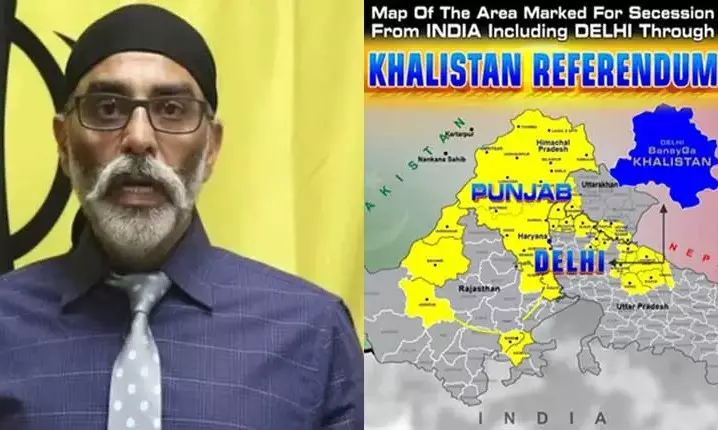
SFJ offers reward for Indian envoy's arrest, includes Delhi in Khalistan map
text_fieldsNew Delhi: At the conclusion of the second phase of the Khalistan referendum on October 29, the radical Sikhs For Justice (SFJ) group announced $100,000 for the arrest of High Commissioner to Canada Sanjay Kumar Verma and released a new map with Delhi as part of Khalistan.
The outlawed extremist group holds Verma responsible for the “assassination” of Sikh separatist Hardeep Singh Nijjar who was gunned down on June 18 this year outside the Guru Nanak Sikh Gurdwara in British Columbia province.
Over 60,000 people turned up on Sunday at the Gurdwara in Surrey, which was headed by Nijjar, in a vote to weigh support for a separate homeland for Sikhs in India, SFJ's legal counsel Gurpatwant Singh Pannun said in a statement shared with IANS.
At the conclusion of the voting, two resolutions were passed by the gathering, which called for Verma's arrest and prosecution for "conspiring and directing Nijjar’s assassination".
SFJ, a banned terror outfit in India, said it will invoke the “Citizen’s Arrest” Clause of the Canadian law for which it has allocated a budget of $100,000.
 Also Read:Israeli airstrikes near Al Quds Hospital in Gaza; death toll nears 8,000
Also Read:Israeli airstrikes near Al Quds Hospital in Gaza; death toll nears 8,000
The group, which has been organising the referendums, also released a new map extending the boundaries of the Sikh homeland to include India’s Capital Delhi as part of Khalistan.
“This is a war between Punjab and India in which the occupying force is using the violence while Sikhs are using the votes,” Pannun said addressing the voters virtually from Washington D.C.
“SFJ is not taking down India with the “Bullets” at this time, instead we are using “Ballots” the most potent weapon of this century - to “Kill the Indian System” which is responsible for the Genocide of Sikhs” Pannun, a designated terrorist, said.
He also slammed India's recent moves to stop visas and cancelling of OCI cards as "terror tactics" employed by the Narendra Modi government to "stop the Khalistan Referendum".
Phase one of the referendum was held last month just as Prime Minister Modi conveyed New Delhi's strong concerns about continuing anti-India activities in Canada to his counterpart Justin Trudeau at the G20 Leaders' Summit.
An SFJ spokesperson said that more than 200,000 people have voted in the combined first and second phase of the voting.
Going forth, the group said that it will be organising referendums in the Canadian cities of Abbotsford, Edmonton, Calgary, and Montreal in 2024.
While October 29 Voting Centre in Surrey was dedicated to Nijjar, the upcoming voting centres will be dedicated to Khalistani leaders Ravinder Singh Pannu, Bhupinder Singh Kooner, and Balbir Singh Khaira, the statement said.
 Also Read:Republican candidate, Mike Pence drops out of US Presidential race
Also Read:Republican candidate, Mike Pence drops out of US Presidential race
A poster war was unleashed in Canada following the death of Nijjar, threatening Indian diplomats and installations, and holding High Commissioner Sanjay Verma and consul generals in Vancouver and Toronto responsible for his death.
Pannun also gave a call to hold rallies at the Indian embassies in G7 countries earlier this month, asking the host governments to shut down Indian diplomatic missions.
Several Khalistan supporters rallied outside Indian diplomatic missions in the Canadian cities of Vancouver, Ottawa and Toronto late in September, insulting the Indian Tricolour and garlanding a poster of PM Modi with slippers.
In a series of videos that surfaced online, he threatened Hindus in Canada, asking them to go back to India and told PM Modi to learn from the Israel-Palestine war lest a similar "reaction" unravels in India. He further dared "a Hamas-like attack on India”.
Tensions flared between India and Canada following Trudeau's allegations, which India denied as "absurd and motivated".
Beginning this year, Khalistanis across the US, the UK, Australia and Canada have been calling referendums, vandalising Hindu temples and Indian missions and installations with anti-India graffiti.
With inputs from agencies























